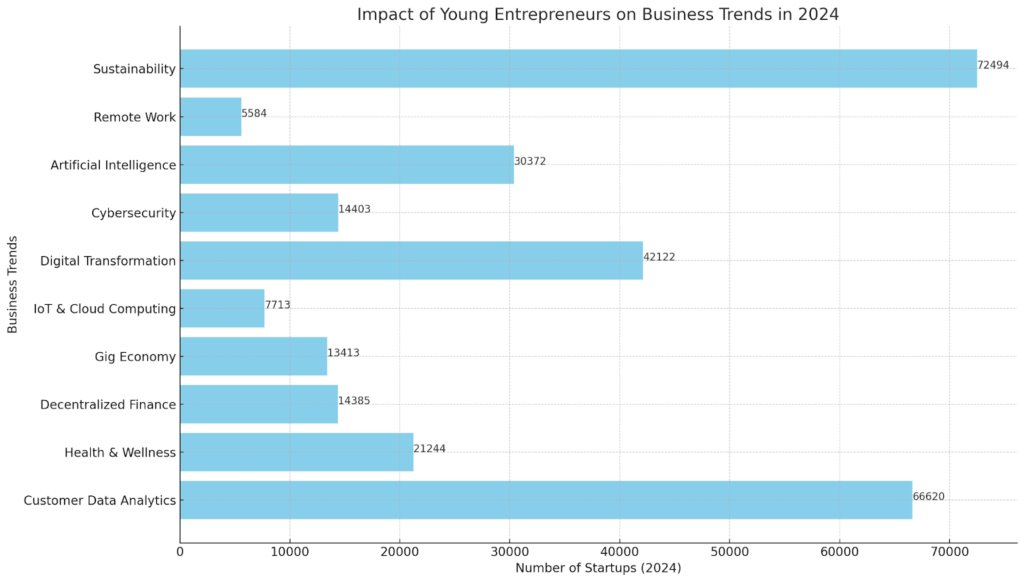In today’s fast-paced business world, a new wave of young leaders is emerging, bringing with them a fresh perspective and a transformative approach. These dynamic individuals are not just participating in the business arena; they are reshaping it. Their innovative thinking, coupled with an innate understanding of technology and digital trends, is creating a significant shift in traditional business paradigms. This article delves into the world of these young entrepreneurs, exploring how their unique vision and digital savvy are forging new paths in various industries.
The influence of young leaders extends beyond mere entrepreneurship; it signifies a broader movement in the business landscape. These trailblazers are distinguished by their ability to think outside conventional frameworks, embrace cutting-edge technologies, and challenge the status quo. Their approach is not just about introducing new products or services; it’s about reinventing business models and strategies for the digital age, thereby catalyzing a paradigm shift across sectors.
The Rise of Young Entrepreneurs
Decoding the Success of Youthful Leadership
The ascent of young entrepreneurs in the business world can be attributed to several key factors. Foremost among these is their comfort with digital technologies and social media, which are powerful tools for brand building and marketing in the modern era. Additionally, their fresh perspectives often lead to innovative solutions to traditional problems, resonating with a new generation of consumers and investors. Their willingness to take risks, coupled with a flexible approach to business, allows for rapid adaptation to market changes.
Spotlight on Trailblazing Young Entrepreneurs
Profiles of notable young entrepreneurs showcase the diverse ways in which they are making their mark. Figures like Mark Zuckerberg, who revolutionized social interaction with Facebook, and Whitney Wolfe Herd, the founder of Bumble who empowered women in the dating app scene, are testament to the profound impact young leaders can have. In different corners of the globe, young innovators are making headlines – from creating sustainable energy solutions to launching groundbreaking tech startups. Their achievements not only highlight their individual prowess but also underscore the collective potential of young minds in shaping the future of business.
Charting a Path to Leadership
Building a Foundation for Success in Business
For aspiring young leaders eager to make their mark in the business world, the journey begins with a solid foundation. This foundation is built on a combination of personal development, strategic networking, and a commitment to innovation. Personal development is crucial; it involves honing skills, expanding knowledge, and cultivating a mindset geared towards growth and learning. It’s about embracing challenges as opportunities to learn and evolve.
Networking: Connecting with Industry Innovators
Networking plays a pivotal role in any successful business career. For young entrepreneurs, building a robust professional network means connecting with mentors, peers, and industry leaders who can provide guidance, support, and opportunities. Attending industry conferences, participating in relevant online forums, and engaging in community events can open doors to valuable collaborations and insights.
Embracing Innovation and Change
In a business landscape that is constantly evolving, embracing innovation is not optional; it’s essential. Young leaders must stay abreast of the latest trends, technologies, and business models. This requires a mindset that is open to change, willing to experiment, and ready to pivot strategies when necessary. Being innovative also means thinking creatively about problem-solving and being open to unconventional ideas and approaches.
Key Traits of Successful Young Leaders
1. Adaptability in a Fast-Changing World
One of the most critical traits of successful young business leaders is adaptability. In an ever-changing business environment, the ability to pivot and adjust strategies quickly is invaluable. This adaptability extends beyond business plans to include adapting to new technologies, market trends, and consumer preferences.
2. Digital Literacy: Navigating the Modern Business Landscape
Digital literacy is no longer just an asset; it’s a necessity. Young leaders excel in this area, often having grown up with technology. This skill set includes understanding digital marketing, being savvy with social media, and leveraging data analytics for strategic decisions.
3. A Commitment to Sustainability
Increasingly, successful young leaders are those who understand the importance of sustainability. This involves not just environmental consciousness but also a commitment to ethical business practices and social responsibility. Incorporating sustainability into business operations and values is becoming a benchmark for success and resilience.
4. Emotional Intelligence: The Key to Effective Leadership
Emotional intelligence – the ability to understand and manage one’s own emotions and those of others – is a defining trait of effective young leaders. It fosters better communication, stronger team dynamics, and more empathetic leadership.
5. Continuous Learning and Curiosity
The willingness to continuously learn and stay curious is another hallmark of young business leaders. They view education as a lifelong process and are always on the lookout for new knowledge and skills that can drive their business forward.
2024 Business Horizon: Young Entrepreneurs’ Impact

The bar graph presents a compelling view of the business landscape in 2024, emphasizing the sectors where young entrepreneurs have a significant impact. It categorizes ten key business trends based on the number of startups in each field.
Customer Data Analytics (66,620 Startups): This sector leads the chart, indicating a strong focus on personalized marketing and customer relationship management, a core area of innovation for young entrepreneurs.
Digital Transformation (42,122 Startups): Showcases the shift towards digital-only business models, reflecting how young business leaders are leveraging technology for more efficient operations.
Artificial Intelligence (30,372 Startups): Highlights the integration of AI in various business processes, a testament to the tech-savvy nature of the current entrepreneurial generation.
Sustainability (72,494 Startups): Although not the highest, it’s a significant focus area, illustrating young entrepreneurs’ commitment to eco-friendly practices and sustainable business models.
Remote Work (5,584 Startups): Reflects the adoption of flexible work models, a trend accelerated by the digital fluency of young business leaders.
Cybersecurity (14,403 Startups): Indicates the growing importance of data protection and security in the digital age.
IoT & Cloud Computing (7,713 Startups): Emphasizes the move towards more interconnected and efficient business operations through IoT and cloud technologies.
Gig Economy (13,413 Startups): Shows the shift in employment models to flexible, project-based work, resonating with the entrepreneurial spirit of the younger generation.
Decentralized Finance (14,385 Startups): Points to the increasing influence of blockchain and cryptocurrency in the finance sector.
Health & Wellness (21,244 Startups): Highlights the focus on employee well-being and holistic approaches to health in the workplace.
This graph illustrates the diverse and transformative impact of young entrepreneurs on the business world in 2024. It underscores their role in driving innovation across various sectors, from technology to sustainability, shaping a new era of business practices.
The Future of Business Leadership
Visionary Perspectives on Evolving Business Practices
As we gaze into the future of business leadership, insights from current young leaders reveal a landscape in constant flux, driven by innovation and a deep sense of purpose. These leaders emphasize that the future of business will be shaped not just by profits but by the impact made on society and the environment. They foresee a shift towards more inclusive, empathetic leadership styles and business models that prioritize sustainability alongside growth.
Embracing Emerging Technologies and Global Trends
Predictions from these young visionaries highlight the growing influence of emerging technologies such as artificial intelligence, blockchain, and the Internet of Things (IoT) in shaping business strategies. They also point to global trends like the shift towards a gig economy, increased remote work, and the rise of social entrepreneurship as key factors that will redefine the nature of business leadership. The leaders of tomorrow are expected to be tech-savvy, globally aware, and socially conscious, adept at navigating these changing dynamics.
Young Leaders and Corporate Responsibility
Pioneering Sustainable and Ethical Business Models
Young leaders are increasingly recognizing the importance of integrating social and environmental responsibility into their business models. This generation of entrepreneurs is not content with the status quo; they are actively seeking ways to make a positive impact. This involves implementing sustainable practices across operations, from sourcing eco-friendly materials to adopting energy-efficient processes, and ensuring fair labor practices in their supply chains.
Success Stories in Sustainability and Ethics
Several businesses led by young entrepreneurs serve as exemplars of this commitment to corporate responsibility. For instance, companies like Patagonia and Allbirds have set benchmarks in sustainability, focusing on minimizing environmental impact while offering high-quality products. Social enterprises are also on the rise, with businesses tackling issues from education and healthcare to renewable energy, proving that ethical practices and profitability can indeed go hand in hand.
FAQs
How are young leaders changing the traditional business landscape?
Young leaders are bringing new perspectives and innovative approaches to business. They are more inclined to leverage digital technologies, prioritize sustainability, and foster inclusive workplaces. Their approach often leads to more agile, forward-thinking businesses that are better equipped to respond to modern challenges.
What challenges do young entrepreneurs typically face?
Young entrepreneurs often grapple with challenges such as limited access to funding, building credibility in a competitive market, and balancing the rapid pace of technological change with sustainable business practices. However, their adaptability and digital fluency provide them with unique tools to overcome these hurdles.
Can young leaders make a significant impact in traditional industries?
Absolutely. Young leaders can bring transformative changes even in traditional industries by introducing new technologies, sustainable practices, and fresh business models. Their ability to challenge conventional wisdom can lead to innovative solutions that rejuvenate established sectors.
In conclusion
The influence of young leaders in today’s business world is undeniable and growing. They are not only making their mark but also transforming the landscape of business with their innovative, adaptable, and responsible approaches. As we look to the future, the role of these young visionaries becomes increasingly crucial. Their blend of technological savvy, commitment to sustainability, and empathetic leadership is shaping the future of business, making it more dynamic, inclusive, and attuned to the needs of both people and the planet.

Thomas J. Powell is the Senior Advisor at Brehon Strategies, a seasoned entrepreneur and a private equity expert. With a career in banking and finance that began in 1988 in Silicon Valley, he boasts over three and a half decades of robust experience in the industry. Powell holds dual citizenship in the European Union and the United States, allowing him to navigate international business environments with ease. A Doctor of Law and Policy student at Northeastern University, he focuses on middle-income workforce housing shortages in rural resort communities. He blends his professional acumen with a strong commitment to community service, having been associated with the Boys and Girls Clubs of America for over 45 years. Follow Thomas J Powell on LinkedIn, Twitter,Crunchbase.

